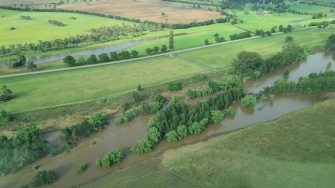
Date: Thursday, December 2, 2021
Project: Eastern Australian Waterbird Survey
Observers: Richard Kingsford & John Porter
Pilot: Tim Dugan
Today was our last leg – and what a relief for us all. It had been a long survey. Much more challenging because of Covid than any other survey we have done. We had to get away early again today to make sure that we took advantage of the break in the weather up north. We hadn’t been able to finish the previous week and there was a window of opportunity today. So, it was up at about 4 a.m. to get away by 5 a.m.
Another early start to fly up to Split Rock Dam near Manila.
The forecast was not great for us to finish the end of Survey band 5, with Armidale still under fog. But it was lovely conditions flying north, across to our first major wetland, Split Rock Dam.
Split Rock Dam on a lovely morning.
Obviously, the country had experienced a lot of rain and it was everywhere to see. The dam which was almost empty last year was now almost full and surprisingly had quite a few waterbirds, mostly cormorants and pelicans. With so much water around, I had expected fewer waterbirds. There was an extensive algal bloom across the surface of the water.
Surveying Split Rock Dam.
Extensive algal bloom across Split Rock Dam.
From here we headed east across the hills towards Armidale. Along the way we surveyed a few small farm dams until we came to a very swollen Gwydir River up in the hills.
Flooding on the Gwydir River, east of Armidale.
Surveying the Gwydir River.
We surveyed this for a while, but there were obviously no waterbirds. We finished up survey band 5 by surveying Dumaresq Dam, one of the water storages for Armidale. The fog, still blanketing the town to the south, had just lifted enough for us to get down. Very few waterbirds here.
And then it was south to the end of survey band 4, which is around the Liddell Power Station near Singleton, and its cooling ponds.
Surveying the dams around Liddell Power Station.
These always have a few swans and cormorants but no other waterbirds. We then finished up our final wetland survey along a very swollen Hunter River.
Flooding along the Hunter River.
Surveying the Hunter River in flood
It generally only has a few black ducks and today was no different. We finished up the morning’s survey back in Sydney, soon after 9am And more than 38,000 km of flight later from the beginning of the survey. It had been a long month and a half.
By Richard Kingsford
